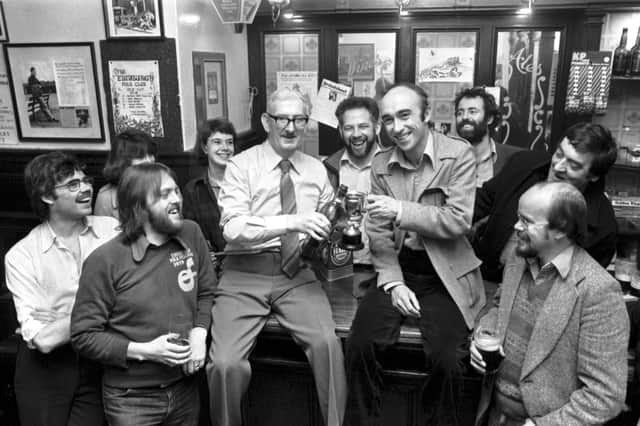The Sinner returns to reveal drama of life on Edinburgh’s folk music scene of the Seventies


It warns: 'The character of the The Sinner is destructive and self destructive in rapid turns. At war with brutal impulses of an id that has never forgotten a single instance of abuse, Dennis Sellars was a character who shocked with his misogyny, even in 1973. In this novel the worst excesses of this young man's journey are its darkest parts; and the book contains several suicide attempts, racial slurs and scenes of domestic abuse.'
It's unlikely such a trigger warning would have ever crossed the mind of the original publisher and begs the question, with attitudes that are now wholly unacceptable, why would anyone desire to give The Sinner a new lease of life.
Advertisement
Hide AdAdvertisement
Hide AdPublisher Peter Burnett, of Leamington Books, is happy to explain his reasons, "The Sinner can be considered a lost classic first and foremost. MacGregor was absolutely in love with his home town, and wanted to make The Sinner the ultimate Edinburgh novel. As a literary document of 1970’s Edinburgh, there is little to match it.”


He continues, “Personally, it’s been something I’ve wanted to do for many years, and having finally obtained permissions I also managed to commission a digital scan in order to preserve it and share it with future readers.”
If the book is a complex exploration of the society of its time, complex is also a word that can be used to describe its author. Born in 1935, MacGregor was a novelist, poet, playwright, songwriter, lecturer and medical doctor. Killed in a car crash in Jamaica, at the age of just 37, the writer never saw his controversial novel published.
"By the time he emigrated and died, MacGregor was no longer performing and writing songs; his death was however a significant loss to Scottish literature,” reflects Burnett. “I for one would have loved to have seen more novels from him. Who knows what he may have written next? John Herdman, his literary executor, says there are two unpublished works in his archive, so it is certain that he would have continued to write, and given his energy would have been quite prolific.”
Advertisement
Hide AdAdvertisement
Hide AdThe Sinner was MacGregor's second novel, the first being The Myrtle and Ivy, published in 1967. Heavily autobiographical, it’s set on the Capital’s folk music scene, indeed in 1958, along with Hamish Henderson, MacGregor co-founded the Edinburgh University Folk Society. A popular face at folk-pub institution Sandy Bell's where he is remembered to this day, in the book MacGregor transforms his favourite Forrest Street bar into ‘Connor's’ while his protagonist Denis Sellars has more than a little in common with the writer himself.
Denis Sellars is a restless, suicidal folksinger and would-be novelist. The city of Edinburgh is his love, his enemies are the forces of progress which seek to make commercial the art and music of Scotland. Rob Sellars, his twin, is a successful folk artiste and has succeeded where Denis has failed; but with the might of right on his side, Denis decides between favour - wider success as an artist - and the raging dark side of himself.
Burnett admits, "I don't know if The Sinner is in fact relevant to today, but it does stand alone as a testament to times past. There is certainly a nostalgia aspect - it will be a long time before we have the camaraderie of folk pubs again. I cannot think of any other novels that cover such ground.”
The Sinner explores the clashes within the folk music world of the Seventies where, vying for superiority are those advocating populism and those championing the more avant-garde scenes, or as it is described in the introduction to the novel, 'The fight between the slick and poppy folk-music that is earning London producers a fortune and preserving the purity of the travelling communities of Scotland.'
Advertisement
Hide AdAdvertisement
Hide Ad"At the time of The Sinner, there certainly was commercial 'White Heather Club' type of music and events that was no doubt derided by the 'real' folksingers of the pubs and howffs,” he says. “MacGregor has taken this as a backdrop for his fiction. There is also an interesting sub-plot, which involves a working-class movement in the Canongate, campaigning for better living conditions because balconies in the area were falling apart and were considered extremely dangerous. In the novel, the community rallies, forms a mass meeting and there is a showdown outside the City Chambers.
“I think in general it carries this theme of righteous populist indignation at corporate or governmental power; the same tension exists within music and literature; the grassroots artists of the local scene versus the commercial forces represented by record companies and the BBC. I’m sure in real life such confrontations never became violent - but they certainly do in the mind of Stuart MacGregor, and in the action of his novel.”
The novel encapsulates its writer’s passion for grass-roots folk music. Edinburgh University Folk Society’s first president he went on to write numerous, now widely recorded, folk songs about Edinburgh life, including the well-loved Coshieville and his best known work, Sandy Bell’s Man.
“MacGregor is still celebrated today. He was an eyewitness with a deft pen. He also founded Edinburgh's The Heretics group, a monthly meeting of musicians and poets, which still goes on today and celebrated its 50th anniversary last year,” concludes Burnett, adding, “and Stuart MacGregor remains the Sandy Bell's Man and to this day, you’ll find a shrine to him in the pub.”
Advertisement
Hide AdAdvertisement
Hide AdSpeaking on behalf of the family, MacGregor's son Andy says, " We are very grateful to Peter Burnett at Leamington Books for his decision to republish the book, as well as for the support over many years of literary executor John Herdman. The Sinner is set in what was a very exciting time for Scottish culture, and we hope that it will provoke much interest today.
"Stuart had quite an impact on those he met - we have lost count of the number of times we have been approached by individuals who want to share anecdotes about him, ranging from the humorous to the scurrilous. One common theme is the warmth in which his friends and acquaintances speak of him, he was clearly a very popular man. We think he would be delighted in the continuing interest in him and in his work."
The Sinner, by Stuart MacGregor, is published by Leamington Books, February 12
A message from the Editor:
Thank you for reading this article. We're more reliant on your support than ever as the shift in consumer habits brought about by coronavirus impacts our advertisers.
If you haven't already, please consider supporting our trusted, fact-checked journalism by taking out a digital subscription
Comment Guidelines
National World encourages reader discussion on our stories. User feedback, insights and back-and-forth exchanges add a rich layer of context to reporting. Please review our Community Guidelines before commenting.